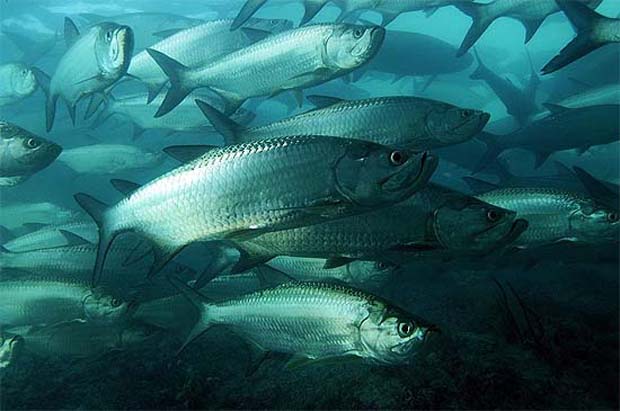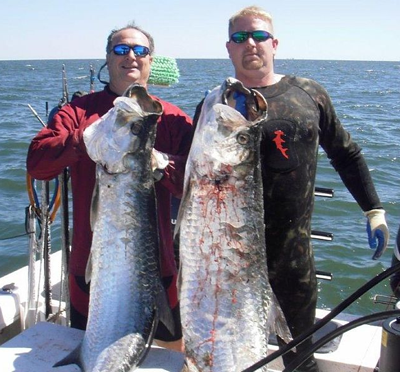It’s Louisiana and tarpon déjà vu
By Nikki Buskey / Staff Writer for  Houma […]
Houma […]
[dropcap]L[/dropcap]ouisiana wildlife officials want fishermen to take an active role in research aimed at learning more about the biology of the tarpon, a popular south Louisiana sport fish.
Anglers are invited to participate in a new tarpon tournament later this summer that aims to collect DNA and biological samples from tarpon to learn more about their lives in the Gulf.
The tarpon is a highly prized sport fish, widely distributed in warm temperature, subtropical and tropical waters. Management practices for tarpon vary from limited to none because very little is known about the movements and migrations, population dynamics, life histories and reproduction that are needed to sustain a fishery.
The fish are known as a fun catch because they put up a good fight. Tarpon anglers are known for their passionate protection of the fishery, and a catch-and-release ethic is becoming more commonplace.
Suzy Delaune, a fisheries biologist with the Louisiana Department of Wildlife and Fisheries’ Marine Lab on Grand Isle, said the state partnered with Florida wildlife officials and Mote Marine Laboratory in Sarasota, Fla., on a tarpon-tagging study in 2010.
Florida officials had been conducting the study, called the Tarpon Genetics Recapture study, since 2005.
The program engages anglers in collecting DNA samples from the tarpon they catch. The DNA fingerprint technique is a very easy, non-invasive and harmless way to “tag” the tarpon by scraping skin cells from the outer jaw or other bony surface with a small abrasive sponge.
Interested anglers are given a DNA tagging kit consisting of a vial of ethanol, scrub pads, and a data sheet. Anglers who catch a tarpon are asked to use the scratch pad to scrape the body surface of the fish’s cheek or jaw before releasing it, and put that pad into a vial of alcohol to be sent off to state scientists. They also record some basic data about the fish and where they caught it.
In that small action, fishermen are contributing valuable information to a growing database. Scientists can tell whether that fish has been caught and released before. It helps scientists to track the population and migration of the large fish.
“It’s not an easily studied fish,” Delaune said. “This will help us to learn more about the population dynamics, so we can see if there’s a stable population out there.”
Fishermen from Louisiana have provided nearly 100 samples since 2011. Delaune said she has even had participants send samples from Trinidad.
“It’s great that we can track the migratory patterns of these fish and see where they are going, and if there are resident fish off the coast of Louisiana,” said Louisiana Department of Wildlife and Fisheries Assistant Secretary Randy Pausina.
In support of furthering these research efforts, the Louisiana Saltwater Series, which will be held out of the Venice Marina, will host a tarpon tournament Aug. 24-25. This is not a traditional fishing contest – it aims to be the most comprehensive and coordinated information-gathering effort in the history of tarpon research.
“Tournaments are the most efficient method for tagging fish,” Pausina said. “The probability of tagging targeted fish goes up during tournaments because the experience level of participating anglers is very high.”
Cash prizes aren’t awarded to the team that catches the biggest fish. It’s all about the number of fish tagged during the contest. The tournament has a 100 percent payout, with a $300 team entry fee.
A kill fish division will also be offered at the tournament, and the team that submits the largest fish will be honored with the Coon Pop Classic Harvie Hawthorne Memorial Trophy.
“The department’s intent in supporting a kill division is to obtain a small number of biological samples from Louisiana waters that will help to generate sound research-based regional management of Louisiana’s historically and biologically significant tarpon resource,” Pausina said.
Specifically, gonads will be removed for studies of reproductive biology, ear bones for age and growth studies, and stomachs for investigations of feeding behavior.
That will help scientists study the reproductive capabilities of tarpon in Louisiana’s waters, as well as other scientific questions focused on Louisiana’s tarpon resource.
DNA samples will be collected from both landed and released fish to help scientists understand the population structure of tarpon in the Gulf of Mexico and adjacent waters. State biologists will also be on hand during the tournament to attach electronic tags to some of the released tarpon to generate data that will tell scientists more about the vertical behavior, migratory patterns and post-release survival of the fish.
For more information or to register, visit www.lasaltwaterseries.com. Online registration will close at noon Aug. 22, but interested anglers will still have the opportunity to register at the Captain’s Meetings on Friday night in Grand Isle and Venice.
[information]
To participate in the ongoing DNA tagging program, you can find pamphlets at area marinas, contact Delaune at sdelaune@wlf.la.gov or call (985) 791-2073 or (985) 787-2168.
Staff Writer Nikki Buskey can be reached at 448-7636 or nicole.buskey@houmatoday.com.
[/information]








